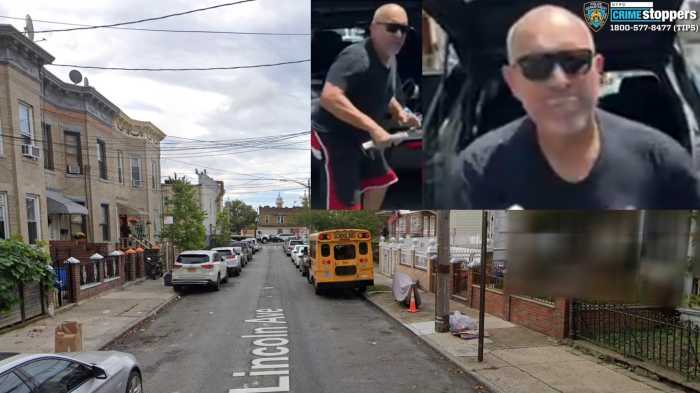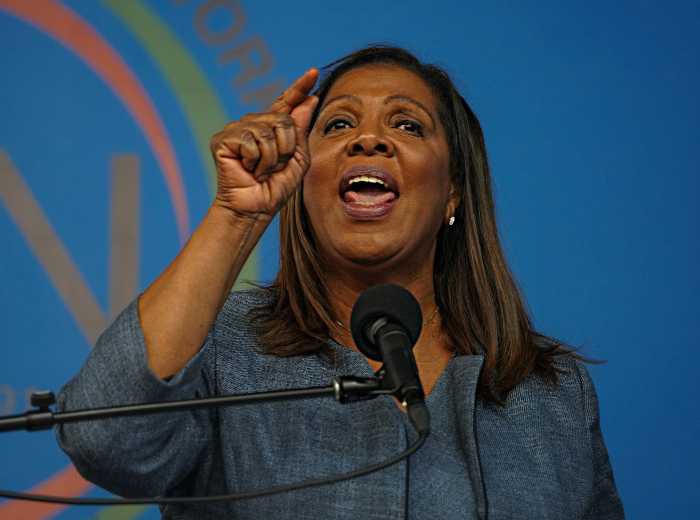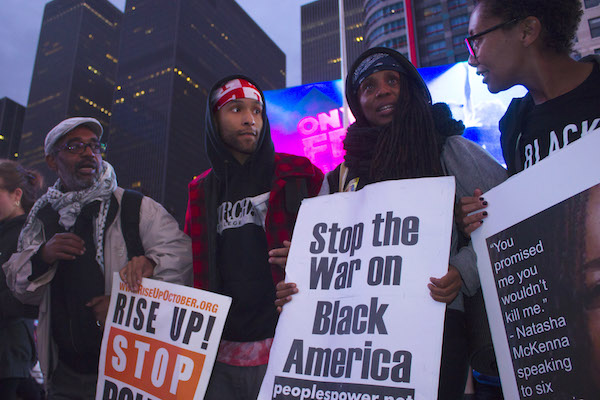
BY ZACH WILLIAMS | Chelsea resident Eileen Feldman was two blocks from home on Sat., Oct. 24 when hundreds of #BlackLivesMatter protesters blocked her path at the intersection of W. 23rd St. and Sixth Ave. The delay irritated her and she was not reluctant to let that be known to those who were marching.
Activist Hannah Raytaylor heard Feldman and confronted her. Protesters were about halfway through the police-permitted march from Washington Square Park to W. 42nd St. as a small group of people stopped to watch Feldman and Raytaylor debate the merits of protesting police brutality on a sunny autumn afternoon.
The hottest point of contention between them was whether the controversial deaths of Eric Garner, Michael Brown, Tamir Rice and other people of color represented the mistakes of just a few policeman or whether law enforcement as a whole protected a system of racial inequality. Neither convinced the other, but their conversation succinctly covered the ground that defines the ongoing national debate on how to address ongoing discrimination against people of color.
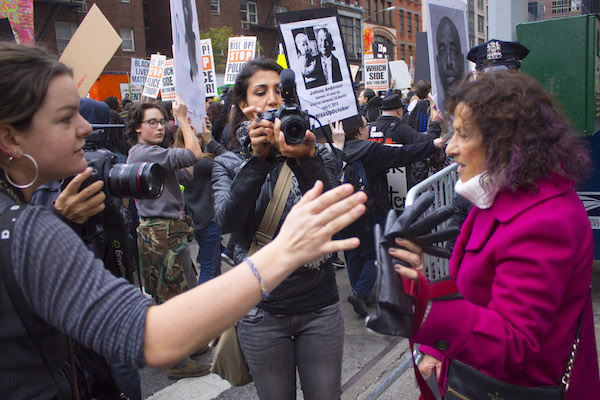
“The country is more divided now than ever,” observed Feldman of the #BlackLivesMatter movement, in a later interview. Protesters, she said, “are making it sound like cops are evil…there is so much hate and moronic stuff coming out now. This county’s got to pull together. That’s why I was so pissed off.”
Raytaylor acknowledged that some may expect certain protocols to be followed during moments of dissent, but she also asserted that disrupting daily life by marching provides a necessary means to achieve progress on racial issues in a society resistant to change.

“I think that inequality is f***ed up, and it should be slowing down and coming to a halt, but it doesn’t seem like that’s going to happen any time soon, so this is very necessary, very necessary,” said Raytaylor, a senior at Bard College. “I told her that if she is annoyed, it is a little more than annoying to have your families murdered constantly. People being murdered, that’s not annoying. It’s infuriating.”
A communal sense of urgency prevailed among the activists throughout the event known by the hashtag #RiseUpOctober and organized by philosopher Cornel West and Carl Dix of the Revolutionary Communist Party, USA. Protesters largely avoided confrontation with the dozens of police officers who shadowed them throughout the day, but organizers did not mince words at the rally held on the northern side of Washington Square Park.

More than a dozen family members of the victims of police shootings came to New York City for the event. Several hundred activists throughout the country listened as they and event organizers urged the crowd to press for police reform as the means to reach a more equitable society. The absence of criminal charges against police who have killed people of color factored heavily into their rhetoric.
“Police are killing us all over this country. Those of us who thought we lived in a region where we thought we were safe got a wake-up call,” said Reverend Jerome McCorry. “We will ask the question, ‘Have you ever seen a good policeman?’ And I will say ‘No,’ because I don’t see them testifying against each other.”
The legal system aids police officers in escaping accountability for the deaths of loved ones, said the family members. No indictments were issued in the cases of Garner and Brown, and a sense of justice eludes Cephus Johnson, whose nephew Oscar Grant was shot in the back in Oakland, Calif. on New Year’s Day 2009. The police officer that shot Grant served a two-year prison sentence for involuntary manslaughter.

Johnson invoked a quote from Dr. Martin Luther King Jr. when he told the crowd why he had come to New York City in memory of his nephew.
“Cowards ask ‘Is it safe?’ Expediency asks, ‘Is it political?’ Vanity asks, ‘Is it popular?’ But conscience asks, ‘Is it right?’ There comes a time when neither safe, political, nor vanity is why you stand. You stand up because it is right. Rise up!” he said.
West added that the rally and march were about “love,” but filmmaker Quentin Tarantino told the crowd that he had to call “murderers the murderers.” The crowd cheered.
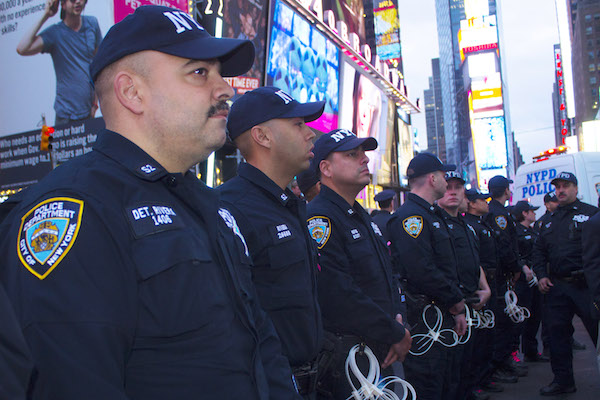
There was room for further vitriol towards law enforcement as the march began to make its way north. A few people among the activists cast aspersions against the police such as “pig” or “the only good cop is a dead cop” but the march as a whole peacefully made its way through the West Village and Chelsea by chanting slogans heard throughout similar actions in the past year. They wanted to “shut it down,” and called the NYPD “racist,” as officers confined the march to one lane to maintain traffic in the other lanes of Sixth Ave.
The point of marching is to express frustration that despite some progress, black and brown people still face entrenched racism in America, according to Harlem resident Rahim Mcillwain, whose 10-year-old daughter Ablessin marched alongside him.
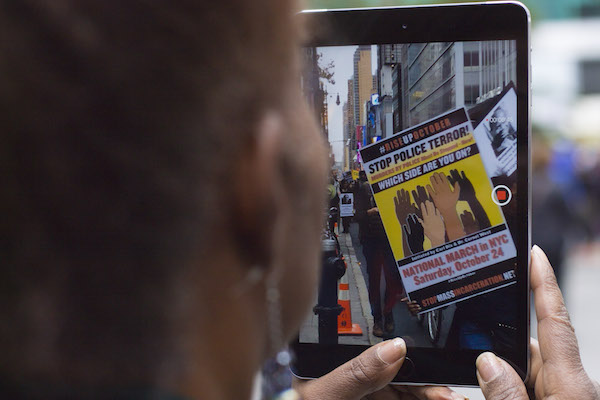
“I think that today should bring about an understanding and letting the people as a whole know what we’re going through,” he said. “There’s a lot on my mind. Words can’t really express how I really feel.”
After rallying again at the intersection of W. 42nd St. and Sixth Ave., a group of about 100 activists moved onwards to Times Square. A woman scaled the statue of composer/playwright/lyricist George M. Cohan, just before a ruckus erupted between police and the protesters. A black man with a child on his shoulders had been standing on an adjacent bench, and was suddenly thrown to the ground by police and swiftly taken away. The remaining crowd jeered at stone-faced police, who arrested several other protesters that day.
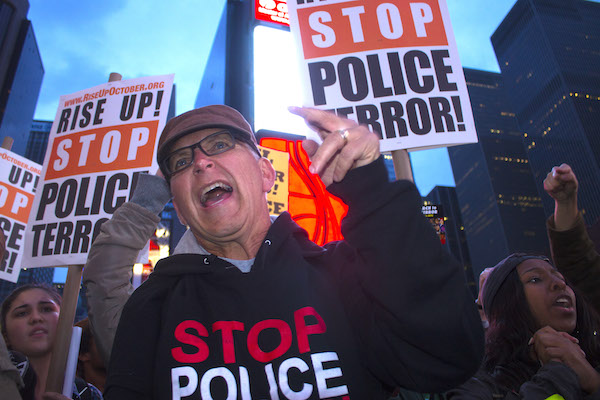
White people among the marchers said that they couldn’t know on a personal level the sentiments of their black and brown counterparts who feel targeted by police on a daily basis. Twenty blocks to the south, Hannah Raytaylor made that case to Eileen Feldman, but the #RiseUpOctober march was as much about self-improvement as spreading the word, Raytaylor said in an interview.
“It’s not my experience. I am of privilege. I have never really had real struggle in my life, and I’m aware of that and I want to be able to raise my awareness as much as possible, be as conscious of a human as I can,” she said.
NOTE: This article was updated on Oct. 31, to reflect the reader comment regarding Carl Dix.



